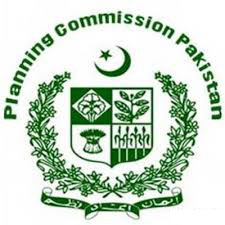
Development & Special Initiatives
Press Release/Tickers

Pakistan-UK Knowledge Corridor: Major Ecosystem of...
Published : 25 April 2024
Planning Minister Ahsan Iqbal held a meeting with a delegation led by ...
Pakistan Embraces Digital Revolution: Ensuring Dig...
Published : 23 April 2024
The digital revolution is reshaping societies worldwide, and Pakistan ...
Pakistan Aims to Reach $3 Trillion Economy by 2047...
Published : 23 April 2024
Pakistan is poised to achieve a $3 trillion economy by 2047, bolstered...
Planning Minister Ahsan Iqbal to receive APO, Meri...
Published : 13 April 2024
Federal Minister for Planning Development and Special Initiatives, Pro...
Deputy Chairman Planning Commission highlights several transportation initiatives
Dated : 6 April 2022
Deputy Chairman Planning Commission, Dr Jehanzeb Khan while virtually speaking at the forum Asia & Pacific Transport Forum 2022 organized by Asian Development Bank (ADB) has stated that Pakistan has taken several transportation initiatives during the last decade including Lahore Orange Line, Karachi Green Line, Peshawar BRT while Karachi Circular Railways has been recently approved.
The forum was organized by ADB to explore solutions for creating a more sustainable and decarbonized transport future for the region.
Director General, ADB Woochong Um, Ricardo Menendez March, Member Green Party New Zealand, Young Tae Kim, Secretary-General, International Transport Forum (ITA), Oh Jaehak, President Korean Transport Institute KOTI also participated in the forum.
This year the theme was ‘Accelerating Transformative & Decarbonized Transport’. The participants discussed the ways and means for accelerating the changes required in transport and mobility.
Speaking at the opening session, Deputy Chairman Planning Commission, Dr Jehanzeb Khan said that a well performing transport and communication structure is vital for a country’s development.
Investment in a country’s infrastructure directly affects economic growth as producers find the best markets for their goods, reducing transportation time and cost, and generating employment
opportunities, he added.
He said that during the last decade, Pakistan has taken several transportation initiatives especially, in big cities like Karachi, Lahore and Peshawar. GreenLine in Karachi, Orange Line in Lahore and BRT in Peshawar were important projects which helped the millions of commuters in the country, he added.
According to him, after the launch of BRT in Peshawar female commuters feel more secure while traveling on public transport as compared to the past which is a positive sign. He informed the forum that by 2030, 30% of all new vehicles sold in Pakistan in various categories will be Electric Vehicles (EVs). Similarly, by 2030, 60% of all energy produced in the country will be generated from renewable energy resources including hydropower.
Dr. Khan highlighted that in order to make the transportation system affordable for people at large, Pakistan requires more such modern transportation systems both in urban areas and between intercity transport.
While highlighting the key issues and challenges, he informed the forum that air pollution creates smog issues in Lahore especially, during winters and congestion in large cities like Lahore, Karachi and Islamabad also poses a big challenge that needs to be addressed.
Dr Khan further informed the forum that Pakistan Nationally Determined Contribution NDC had projected 300% growth in GHG emissions for the period of (2015-2030) based on projected 9% Gross Domestic Product GDP growth and increased reliance on fossil fuels.
According to him, the estimates have been revised downwards largely due to TBTTP (2016-2021) sequestration of 8.4 MtCO2es.
In addition to NDC target, the government has approved EV Policy with aims to shift 30% of all vehicles to electric passengers’ vehicles and 50% to electric two/three -wheelers and buses by 2030.
Similarly, he informed the forum that Pakistan Railways has two flagship projects Karachi Circular Railway KCR and Karachi-Pipri Freight Corridor which are going to transform the entire public and freight transportation landscape of the metropolitan city of Karachi while easing congestion in the city.
The other participants from Korea, New Zealand, United Kingdom, France and ADB also shared their perspectives on the main transport challenges and opportunities in developing Asian countries, especially, the impact of pandemic and international development agreements _the SDGs and the Paris agreement on the transport sector.








